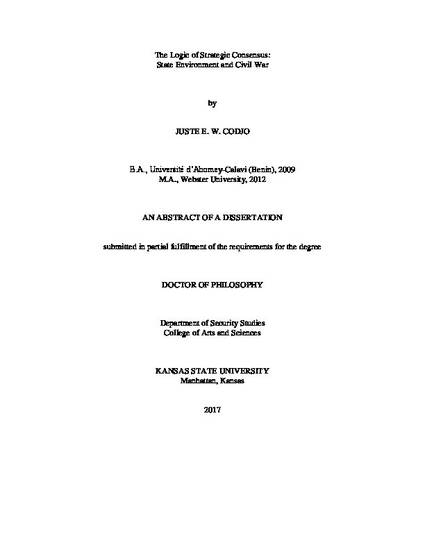
Dissertation
The Logic of Strategic Consensus: State Environment and Civil War
(2017)
Abstract
Why are states sometimes unable to avoid the occurrence of civil war? Most existing theories of civil war focus on rebels’ motivation and capabilities, while taking government’s actions as givens. Not only is the government a key player in the process leading up to civil war, but it is also a non-unitary actor composed of individuals and groups with diverging aspirations. Thus, understanding civil war requires an explanation of the conditions that facilitate or impede what governments do to provide political order.
To fill this gap, this dissertation proposes a state-centered theory that explains civil war as an indirect function of state environment, defined in terms of structural and institutional conditions under which governments operate. The argument is that state environment determines the scope of leaders’ consensus on accommodation and coercion, two strategies that governments rely on to provide political order. Specifically, harsh socioeconomic conditions reduce leaders’ strategic consensus. Moreover, leaders’ divisions in socioeconomically poor societies is further exacerbated by democratic institutions. In turn, the lack of consensus on accommodation and coercion increases the risks of civil war.
Quantitative and qualitative methods are used to test the theory. The quantitative analysis relies on mediation techniques and on a cross-sectional time series of 162 countries from 1960 to 2007. The results support the theoretical argument. Socioeconomic development is indirectly and inversely related to civil war. About two-thirds of its effect is transmitted through accommodation, while one-third occurs through coercion. Moreover, democratic institutions are positively associated with civil war. When socioeconomic development is low, states with open institutions are the least accommodative and the most coercive.
The qualitative methods of “structured, focused comparison” and “process tracing” are used to investigate three cases (Côte d’Ivoire, Romania, and Benin). The findings show that the emergence of sociopolitical dissidence often results from changes in the structure of the state’s socioeconomic or political environment. However, the risks of escalation into civil war are highest when leaders lack consensus about a strategy to resolve the issue at stake. In turn, leaders’ disunity about a bargaining strategy is found to be a product of calculations for political survival.
Keywords
- Civil War,
- Political Instability,
- Political Institutions,
- Conflict Studies,
- African Studies,
- Public Governance
Disciplines
Publication Date
Spring April 21, 2017
Degree
Ph.D.
Field of study
International Relations/Security Studies
Department
Security Studies
Advisors
Emizet F. Kisangani; Jeffrey Pickering; Carla Martinez Machain; Andrew Orr
DOI
http://hdl.handle.net/2097/35493
Citation Information
Juste Codjo. "The Logic of Strategic Consensus: State Environment and Civil War" (2017) Available at: http://works.bepress.com/juste-codjo/2/
